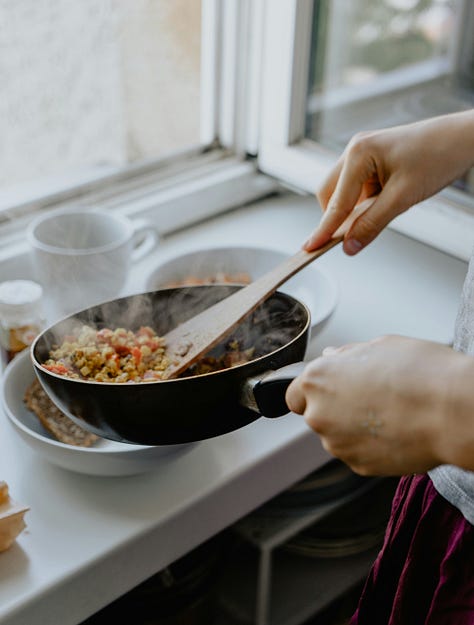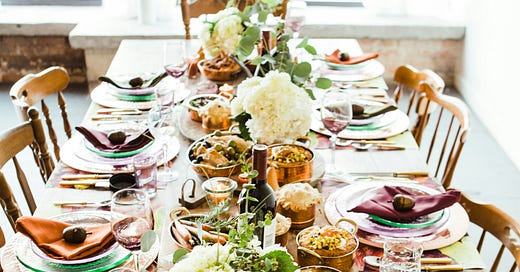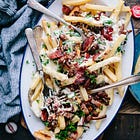Part 03 Action: Fall Out Of Love With Food
I'm challenging you to fall out of love with food because it really can't give you what you want it to. You can love food without loving food. Learn how inside.
Did you miss the first two lessons and action items? Check them out below.
I love food.
Making this lesson feel somewhat hypocritical on the outside.
But I find the need as we round out this mini-series on Food Freedom to clarify the difference between loving food and loving food.
You can't see it yet, but the two are very different. Your connection to food influences how and why you eat and, more importantly, what your body does with it.
As you've learned, the most important factor of health is understanding what your body does with what you provide.
It's not up to you to decide how your body will change.
That role is solely devoted to your biology. But you can support your body and, in the process, influence how it changes, which hopefully, in its own way, creates a sense of food freedom.
Understanding food is more than what you consume. It is the connection that food has in and surrounding your life. And that connection changes you because it changes your biology.



We've already discussed that food matters, as does your perception of food. But I also need you to know that food offers more than nourishment. It provides the ability to connect more deeply with others.
Research has found endless health benefits based on the communal aspect of food.
Food wasn't only intended for nourishment.
It was made for connection, becoming a bridge that brings people together in celebrations, grief, and the everyday mundane.
The fact is that eating with others completely changes your biology. Studies suggest your well-being is determined by your connections.
Yet, this information explains why so many people live confined by food. Not because food is the problem but because you've failed to find what you are looking for in others. So, instead, you turn to food.
This is really important to understand.
Your external relationships with others and God are changing and shaping your relationship with food.
Arguably, it could be the very reason you have so many food issues to begin with. Not because you wanted them, but it's what you had to do to survive.
Every human has a deep need to be seen, known, and loved. This need is born out of our dependence. Humans were not created to be alone; we are all interconnected and, more importantly, connected to God.
Yet, in our brokenness, this has become messy. It's become more difficult not only to feel loved but also to give love. Giving way to the reasons we've developed such a love for substances like food.
Not because you chose it but to fill a void that had developed from the brokenness of relationships.
Take my client Roxanne, for instance.
Roxanne (I've changed her name for her protection) bounded into my office looking for what everyone had always wanted - a quick fix to their weight problems that could be solved within the typical 30-60 day time window.
Roxanne gave me 60 days. The exact amount of time before they set off on their anniversary cruise.
After getting to know Roxanne, I decided to fulfill her request. Not because I thought it would work. I knew most people never followed what I created. But at the time, I hadn't figured out that most people's weight problems didn't have to do with what they were eating but with the relationship they'd built around food, health, and even themselves.
That's why I gave Roxanne what she wanted, at least at first.
But things quickly got more interesting.
As Roxanne came barreling back into my office, she started spewing why she couldn't follow the plan even before she had time to sit down.
Everyone made the same promise. They believed things could actually be different. But I knew they never were. The same patterns existed with a hundred other clients, and my morals were starting to get the best of me. I had to try something different.
I decided to push Roxanne in a different direction.
As we talked, I challenged her to stop worrying about what she ate and start paying attention to where she ate it. From her intake, I had gathered that Roxanne struggled to sit down to eat, even when her friends invited her out.
There was something there. I just couldn't see it. What I thought was an easy request (much more straightforward than attempting to change what she ate) gave way to the reasons she had never been able to change.
Sitting at the kitchen table struck a nerve in Roxanne. Immediately, her usual 'full-of-life demeanor' vanished. She told me she couldn't do that.
I challenged her, not knowing the extent of the trauma she had experienced and why what I perceived as such a simple request felt impossible to her.
We didn't unearth it right away. It took time, and there are many layers I won't get into here. But eventually, I learned that the kitchen table held some of Roxanne's deepest pains.
As a child, the dinner table was where her dad would have fits of drunken rage. Some nights, he took it out on her mom. Other times, it was her sister and her. But most nights, she turned to food, finding love and safety in the stash she hid under her bed.
Yet, if we're not careful, we'll mistake the problem as the scapegoat we use to cover up the problem.
Food was never Roxanne's problem. It's what she learned to use to survive the problem.
And in the process, food became a source of love for her.
While it is possible to experience love from substances, it's never the type of love you long for. It's not the intended design, but it is addictive. You long for love so deeply that you'll do nearly anything to feel it, no matter how unhealthy it may be.









